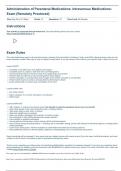Administration of Parenteral Medications: Intravenous Medications:
Exam (Remotely Proctored)
Due May 26 at 11:59pm Points 12 Questions 12 Time Limit 24 Minutes
Instructions
This activity is proctored through Honorlock. Click the following link to see how it works:
https://youtu.be/wRWE-9PUquo
Exam Rules
The rules listed below apply to all proctored exams, including (but not limited to) midterms, finals, and HESIs. Because these rules are mea
exam scenarios, certain rules may or may not apply to every exam. If you are unsure of the rules for your specific exam, reach out to your i
Learner MUST:
Complete a recorded room scan before exam begins
Complete exam at a table or desk free from non-testing items
Cell phone/smart phone must be at least arm’s length away during exam
Present valid and clear ID on the recording before exam begins
Present calculator on camera before exam begins (if on-screen calculator is not allowed)
Present white board on camera, showing that the white board is blank
Erase white board on camera upon completion of the exam
Learners MAY have:
Dry erase marker
Basic calculator, if on-screen calculator is not allowed
White board
Learners MAY NOT:
Talk, whisper, or read out loud during exam (not allowed to read the questions aloud, even to yourself)
Allow other people in the room during the exam, including children
Take exam while on bed, sofa, or recliner
Wear/use headphones or earbuds
Wear non-religious headgear (for example, no hoods or hats)
Use dictionary or other textbooks/resources (exam specific)
Use scientific or graphing calculators
Use smartphone during exam unless making call for technical support
Use of phone during recording session – including use as calculator, texting, phone calls (except for technical support), or taking picture
strictly prohibited
Leave room during exam, with the exception of a brief bathroom break per proctoring protocol
Have additional screens or devices (tablet, additional computer/laptop, etc.) in testing area during exam
Exam recordings will be reviewed. If any exam rules are violated, learner will receive a zero (0) on the exam, forfeit that attempt, and may b
violation to the Conduct Committee as part of dispositional disciplinary action.
Thank you for respecting our testing rules and maintaining Nightingale’s reputation for academic integrity. If you have any questions about
accommodations for disability under the Americans with Disabilities Act, please contact your advisor. For more information and a video abo
College Exam Rules page in Canvas.
This study source was downloaded by 100000823202934 from CourseHero.com on 08-15-2024 04:16:33 GMT -05:00
https://www.coursehero.com/file/234708441/Administration-of-Parenteral-Medications-Intravenous-Medications-Exam-Remotely-Proctored-BSN266/
, Thank you and best of luck!
The Nightingale College Team
Attempt History
Attempt Time Score
LATEST Attempt 1 8 minutes 12 out of 12
Score for this quiz: 12 out of 12
Submitted May 26 at 8:48pm
This attempt took 8 minutes.
Question 1 pts
Which of the following are assessment measures the nurse should make before administering an IV medication? (Select all that
apply.)
Length of time patient has been hospitalized.
Assistive personnel's ability to monitor infusion.
Patient's understanding of medication therapy.
History of medication allergies.
Rate of infusion.
Drug information and compatibility.
Patency and appearance of IV site.
The nurse should assess the IV site for patency because a patent IV is necessary for IV medication administration. The
nurse should assess the IV site for infiltration or phlebitis that would require discontinuing the catheter and initiating a new
IV site. To avoid administration of a contraindicated medication, the nurse must check the patient's history of medication
allergies. The nurse should determine whether the patient has a history or presence of liver or renal disease, which can
affect drug absorption, metabolism, and excretion, increasing the patient's risk of drug toxicity. The nurse may ask the
patient to state the purpose, side effects, dosage, and frequency of medication therapy to validate the patient's
understanding, which may reveal a need for further education. The nurse may use a drug reference to verify the action,
purpose, onset, peak, usual dose, side effects, and nursing implications of the medication to administer the medication
safely and monitor the patient's response to therapy. Determining compatibility of medications and IV solutions is important
to avoid crystallization of solution or clouding of IV fluids. Checking the rate of infusion is necessary to administer a
medication safely by the IV route. Medications that are given too rapidly can cause the patient to have serious adverse
outcomes. Determining the length of the patient's hospitalization is unnecessary. It is the nurse's responsibility to monitor
the patient's infusion, although assistive personnel may be instructed to report any adverse reactions or complaints the
patient is having.
Question 2 pts
Which of the following is a correct sequence for administering an IV piggyback through an existing IV infusion that uses a
needleless system?
This study source was downloaded by 100000823202934 from CourseHero.com on 08-15-2024 04:16:33 GMT -05:00
https://www.coursehero.com/file/234708441/Administration-of-Parenteral-Medications-Intravenous-Medications-Exam-Remotely-Proctored-BSN266/




